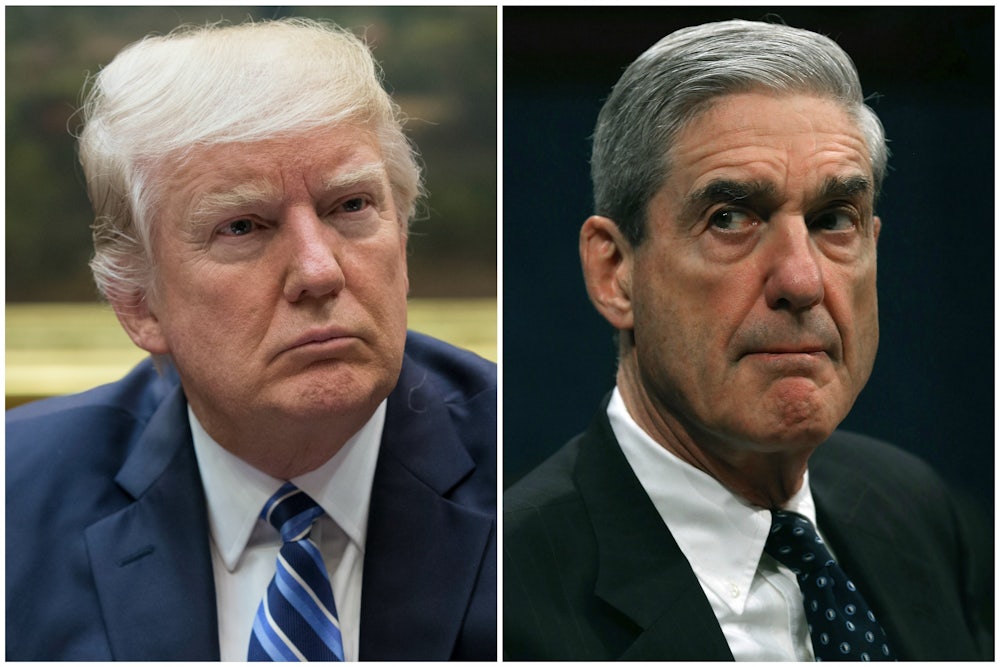Looking backwards after more than a month, the firing of James Comey has blended into the larger pattern of scandal engulfing Donald Trump’s presidency. This may have been inevitable; in a sense, Trump’s decision to fire the FBI director was a single plot point in an unfolding saga. But the effect has been to obscure in our memories just how shocking that development was when it happened. Politics is full of surprises, but the Comey firing was truly astonishing.
It was also, politically speaking, a tactical mistake. Firing Comey precipitated the appointment of Justice Department Special Counsel Robert Mueller, and thrust the White House into crisis.
But the unexpectedness of it may have had the mitigating effect of forcing members of Congress into partisan corners. Democrats, of course, were appalled by Trump’s decision, and used it to renew their calls for the appointment of a special counsel. Republicans, forced unexpectedly to choose between standing with the president and condemning him for a decision they had no say in, overwhelmingly toed the line that Trump had every right to fire the FBI director.
Against that backdrop, it is unnerving to see Trump loyalists not simply question Mueller’s independence for partisan purposes, but lay the groundwork for Trump to engineer his firing as well.
Republicans are delusional if they think the special counsel is going to be fair. Look who he is hiring.check fec reports. Time to rethink.
— Newt Gingrich (@newtgingrich) June 12, 2017
Sessions never should've recused himself. Now that we know TRUMP IS NOT UNDER INVESTIGATION, Sessions should take it back & fire Mueller.
— Ann Coulter (@AnnCoulter) June 12, 2017
It would be comforting to believe that Trump learned his lesson from the Comey firing. But the lesson he may have learned, from this, and so many other transgressions, is that time will dull the political consequences of all kinds of corruption, as long as Republicans in Congress lend their complicity to it.
Under the circumstances, it’s important to lay down a marker now and force Republicans to take an immediate position on the propriety of firing Mueller, so they can’t hide behind technicalities if Trump springs another surprise on us.
Ridding himself of Mueller wouldn’t be as straightforward for Trump as firing Comey was. Because Mueller isn’t a presidential appointee, the authority to fire him rests with the attorney general—or would have, anyway, if Jeff Sessions hadn’t recused himself from the Russia investigation. Assuming Sessions wouldn’t take the nakedly unethical step of withdrawing his own recusal, the authority to fire Mueller rests instead with Deputy Attorney General Rod Rosenstein.
Trump could confront Rosenstein with a choice between firing Mueller and losing his job. He could also void the regulations that allowed Rosenstein to appoint Mueller in the first place. The president is weighing something along these lines, according to his friend, Newsmax CEO Christopher Ruddy.
Trump is "considering perhaps terminating" the special counsel Robert Mueller, "he is weighing that option" @ChrisRuddyNMX to @JudyWoodruff
— Sara Just (@sarajust) June 12, 2017
If Rosenstein resigned, the decision would fall down the chain of command at the Justice Department until someone agreed to follow orders—a nearly perfect reenactment of Richard Nixon’s sabotage of Watergate prosecutor Archibald Cox, otherwise know as the Saturday Night Massacre.
Complicating matters further—though only as far further as we trust Sean Spicer—is the fact that on Monday, the White House press secretary reaffirmed Trump’s pledge to testify to Mueller under oath. “He was … specifically asked whether he would talk to Director Mueller, and he made it very clear what his position was,” Spicer said.
But if Trump determined that the wrongdoing he’s hiding would be more politically damaging to him than the certain blowback he’d face for blowing up Mueller’s investigation, he’d do it. His decision to fire Comey proves as much. And Republicans in Congress would probably feel compelled, once again, to excuse his conduct. The GOP’s indifference to Comey’s fate put the rule of law under immense strain, and if Trump is allowed to sack Mueller or pardon his own inner circle, with no meaningful political consequences until the midterm elections at the earliest, it’ll be a horribly corrosive development—one that Democrats shouldn’t invite for narrow political gain.
Representative Adam Schiff, who serves as vice chairman of the House Intelligence Committee, suggests that Congress would be obligated to reappoint Mueller to his investigatory role legislatively if Trump extinguishes the special counsel one way or another.
If President fired Bob Mueller, Congress would immediately re-establish independent counsel and appoint Bob Mueller. Don't waste our time.
— Adam Schiff (@RepAdamSchiff) June 12, 2017
Democrats could also forestall Trump’s interference by stating that such extraordinary corruption would merit impeachment. Party leaders have been generally and unnecessarily sheepish about calling for Trump’s impeachment, but this would be a perfectly defensible place for them to draw a bright line. Getting ahead of the story would force Republicans to comment on the issue before Trump makes another reckless decision rather than after, hopefully limiting his options.
Minority Leader Chuck Schumer took a preliminary step in this direction on Monday, using the Senate floor to denounce the “shameful ploy” by Trump loyalists who are trying to undermine Mueller’s credibility.
But Newt Gingrich and other supplicants aren’t the ultimate targets here—except insofar as Trump might take cues from them and initiate another sneak attack on the man investigating him. Democrats should hope Trump doesn’t go that route again, but they should be planning as if he will.
Correction: A previous version of this story incorrectly stated that Mueller isn’t an employee of the executive branch. He isn’t a presidential appointee.
